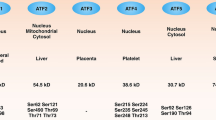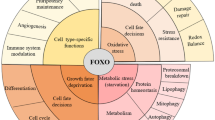Abstract
Cells are continuously exposed to reactive oxygen species (ROS) generated by aerobic metabolism. Excessively generated ROS causes severe dysfunctions to cells as oxidative stress. On the other hand, there is increasing evidence that ROS plays important roles as a signaling intermediate that induces a wide variety of cellular responses such as proliferation, differentiation, senescence, and apoptosis. To transmit physiological ROS-mediated signals and to adapt to oxidative stress, cells are equipped with various intracellular signal transduction systems, represented by mitogen-activated protein kinase (MAPK) cascades. Apoptosis signal-regulating kinase 1 (ASK1) is an upstream regulator of the stress-activated MAPK cascades and has been shown to play critical roles in ROS-mediated cellular responses. Here, we highlight the roles of members of the ASK family, which consists of ASK1 and newly characterized ASK2, in ROS signaling with their possible involvement in human diseases.



Similar content being viewed by others
Explore related subjects
Discover the latest articles and news from researchers in related subjects, suggested using machine learning.References
Kyriakis, J. M., & Avruch, J. (2001). Mammalian mitogen-activated protein kinase signal transduction pathways activated by stress and inflammation. Physiological Reviews, 81, 807–869.
Wang, X. S., Diener, K., Jannuzzi, D., Trollinger, D., Tan, T. H., Lichenstein, H., Zukowski, M., & Yao, Z. (1996). Molecular cloning and characterization of a novel protein kinase with a catalytic domain homologous to mitogen-activated protein kinase kinase kinase. The Journal of Biological Chemistry, 271, 31607–31611.
Ichijo, H., Nishida, E., Irie, K., ten, Dijke P., Saitoh, M., Moriguchi, T., Takagi, M., Matsumoto, K., Miyazono, K., & Gotoh, Y. (1997). Induction of apoptosis by ASK1, a mammalian MAPKKK that activates SAPK/JNK and p38 signaling pathways. Science, 275, 90–94.
Takeda, K., Shimozono, R., Noguchi, T., Umeda, T., Morimoto, Y., Naguro, I., Tobiume, K., Saitoh, M., Matsuzawa, A., & Ichijo, H. (2007). Apoptosis Signal-regulating Kinase (ASK) 2 functions as a mitogen-activated protein kinase kinase kinase in a heteromeric complex with ASK1. The Journal of Biological Chemistry, 282, 7522–7531.
Sekine, Y., Takeda, K., & Ichijo, H. (2006). The ASK1-MAP kinase signaling in ER stress and neurodegenerative diseases. Current Molecular Medicine, 6, 87–97.
Hayakawa, T., Matsuzawa, A., Noguchi, T., Takeda, K., & Ichijo, H. (2006). The ASK1-MAP kinase pathways in immune and stress responses. Microbes and Infection, 8, 1098–1107.
Nagai, H., Noguchi, T., Takeda, K., & Ichijo, H. (2007). Pathophysiological Roles of ASK1-MAP kinase signaling pathways. Journal of Biochemistry and Molecular Biology, 40, 1–6.
Tobiume, K., Saitoh, M., & Ichijo, H. (2002). Activation of apoptosis signal-regulating kinase 1 by the stress-induced activating phosphorylation of pre-formed oligomer. Journal of Cellular Physiology, 191, 95–104.
Fujino, G., Noguchi, T., Takeda, K., & Ichijo, H. (2006). Thioredoxin and protein kinases in redox signaling. Seminars in Cancer Biology, 16, 427–435.
Saitoh, M., Nishitoh, H., Fujii, M., Takeda, K., Tobiume, K., Sawada, Y., Kawabata, M., Miyazono, K., & Ichijo, H. (1998). Mammalian thioredoxin is a direct inhibitor of apoptosis signal-regulating kinase (ASK) 1. The EMBO Journal, 17, 2596–2606.
Noguchi, T., Takeda, K., Matsuzawa, A., Saegusa, K., Nakano, H., Gohda, J., Inoue, J. I., & Ichijo, H. (2005). Recruitment of tumor necrosis factor receptor-associated factor family proteins to apoptosis signal-regulating kinase 1 signalosome is essential for oxidative stress-induced cell death. The Journal of Biological Chemistry, 280, 37033–37040.
Wang, X. S., Diener, K., Tan, T. H., & Yao, Z. (1998). MAPKKK6, a novel mitogen-activated protein kinase kinase kinase, that associates with MAPKKK5. Biochemical and Biophysical Research Communications, 253, 33–37.
Tobiume, K., Matsuzawa, A., Takahashi, T., Nishitoh, H., Morita, K., Takeda, K., Minowa, O., Miyazono, K., Noda, T., & Ichijo, H. (2001). ASK1 is required for sustained activations of JNK/p38 MAP kinases and apoptosis. EMBO Reorts, 2, 222–228.
Liu, H., Nishitoh, H., Ichijo, H., & Kyriakis, J. M. (2000). Activation of apoptosis signal-regulating kinase 1 (ASK1) by tumor necrosis factor receptor-associated factor 2 requires prior dissociation of the ASK1 inhibitor thioredoxin. Molecular and Cellular Biology, 20, 2198–2208.
Lin, Y., Choksi, S., Shen, H. M., Yang, Q. F., Hur, G. M., Kim, Y. S., Tran, J. H., Nedospasov, S. A., & Liu, Z. G. (2004). Tumor necrosis factor-induced nonapoptotic cell death requires receptor-interacting protein-mediated cellular reactive oxygen species accumulation. The Journal of Biological Chemistry, 279, 10822–10828.
Akira, S., & Takeda, K. (2004). Toll-like receptor signalling. Nature Reviews. Immunology, 4, 499–511.
Matsuzawa, A., Saegusa, K., Noguchi, T., Sadamitsu, C., Nishitoh, H., Nagai, S., Koyasu, S., Matsumoto, K., Takeda, K., & Ichijo, H. (2005). ROS-dependent activation of the TRAF6-ASK1-p38 pathway is selectively required for TLR4-mediated innate immunity. Nature Immunology, 6, 587–592.
Bedard, K., & Krause, K. H. (2007). The NOX family of ROS-generating NADPH oxidases: Physiology and pathophysiology. Physiological Reviews, 87, 245–313.
Park, H. S., Jung, H. Y., Park, E. Y., Kim, J., Lee, W. J., & Bae, Y. S. (2004). Cutting edge: Direct interaction of TLR4 with NAD(P)H oxidase 4 isozyme is essential for lipopolysaccharide-induced production of reactive oxygen species and activation of NF-kappa B. Journal of Immunology, 173, 3589–3593.
Chiang, E., Dang, O., Anderson, K., Matsuzawa, A., Ichijo, H., & David, M. (2006). Cutting edge: Apoptosis-regulating signal kinase 1 is required for reactive oxygen species-mediated activation of IFN regulatory factor 3 by lipopolysaccharide. Journal of Immunology, 176, 5720–5724.
Valko, M., Leibfritz, D., Moncol, J., Cronin, M. T., Mazur, M., & Telser, J. (2007). Free radicals and antioxidants in normal physiological functions and human disease. The International Journal Of Biochemistry and Cell Biology, 39, 44–84.
Kadowaki, H., Nishitoh, H., Urano, F., Sadamitsu, C., Matsuzawa, A., Takeda, K., Masutani, H., Yodoi, J., Urano, Y., Nagano, T., & Ichijo, H. (2005). Amyloid beta induces neuronal cell death through ROS-mediated ASK1 activation. Cell Death and Differentiation, 12, 19–24.
Takimoto, E., & Kass, D. A. (2007). Role of oxidative stress in cardiac hypertrophy and remodeling. Hypertension, 49, 241–248.
Izumiya, Y., Kim, S., Izumi, Y., Yoshida, K., Yoshiyama, M., Matsuzawa, A., Ichijo, H., & Iwao, H. (2003). Apoptosis signal-regulating kinase 1 plays a pivotal role in angiotensin II-induced cardiac hypertrophy and remodeling. Circulation Research, 93, 874–883.
Buja, L. M. (2005). Myocardial ischemia and reperfusion injury. Cardiovascular Pathology, 14, 170–175.
Watanabe, T., Otsu, K., Takeda, T., Yamaguchi, O., Hikoso, S., Kashiwase, K., Higuchi, Y., Taniike, M., Nakai, A., Matsumura, Y., Nishida, K., Ichijo, H., & Hori, M. (2005). Apoptosis signal-regulating kinase 1 is involved not only in apoptosis but also in non-apoptotic cardiomyocyte death. Biochemical and Biophysical Research Communications, 333, 562–567.
Author information
Authors and Affiliations
Corresponding author
Rights and permissions
About this article
Cite this article
Fujisawa, T., Takeda, K. & Ichijo, H. ASK Family Proteins in Stress Response and Disease. Mol Biotechnol 37, 13–18 (2007). https://doi.org/10.1007/s12033-007-0053-x
Published:
Issue Date:
DOI: https://doi.org/10.1007/s12033-007-0053-x
Keywords
Profiles
- Takao Fujisawa View author profile




